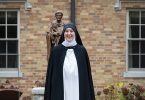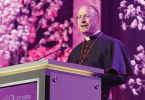
by Joe Bollig
joe.bollig@theleaven.org
KANSAS CITY, Kan. — It had never happened before. Public Masses in the archdiocese are canceled, and gatherings of more than 10 people are banned.
The pews are empty and the churches dark.
Parishioners stay home and watch the Mass on television or livestreamed over the Internet.
There is an exception, and for that, Father Brian Schieber was grateful.
“I’ve had a funeral yesterday and today (March 19),” said Father Schieber, pastor of St. Michael the Archangel Parish in Leawood. “We’re still allowed in Johnson County to celebrate funeral Masses, but they are limited to 10 people.
“I was thankful that I had the opportunity to celebrate Mass with other people. . . . I have been celebrating my own private Masses. It makes you realize we’ve taken it for granted, and what a privilege it is to celebrate Mass as a body of believers.”
Like other priests of the Archdiocese of Kansas City in Kansas, Father Barry Clayton still celebrates Mass on Sundays — but alone. And it’s not just on Sundays that they are celebrating alone. They do it daily.
“Certainly, on Sunday, it’s very different,” said Father Clayton, pastor of St. Philip Neri in Osawatomie, Sacred Heart Parish in Mound City and Our Lady of Lourdes in La Cygne.
“There is a feeling of absence and missing your parishioners who you usually gather with,” he said. “This might be the longest stretch of time that I’ve gone without meeting my parishioners.”
Uncommonly common
This coronavirus pandemic might be the first time most Catholics have become aware of the distinction between private and public Masses, or even realized that there was such a thing as a private Mass.
Even so, there have always been public and private Masses.
Priests are encouraged to celebrate the Mass daily, and most of them do. During a “day off” from the parish or on vacation, most priests will celebrate Mass, and sometimes they do it alone.
Is that allowed? Yes, it is even encouraged! According to canon 904, “daily celebration is recommended earnestly since even if the faithful cannot be present, it is the act of Christ and the Church in which priests fulfill their principal function.”
The real distinction is between Mass with or without a congregation, said Andrew Salzmann, associate professor of theology at Benedictine College in Atchison. A Mass without a congregation still has a deep intrinsic value.
When a Protestant service is canceled due to a blizzard, the pastor doesn’t go to the empty church and preach a sermon to the vacant pews. There wouldn’t be a purpose.
But a Catholic priest will go from his rectory to the empty church and celebrate Mass, because there is a purpose.
Things visible and invisible
But even without anyone else present, the Mass still has value, for two reasons.
First, when the priest celebrates the Mass, he acts “in persona ecclesiae” — “in the person of the church” — representing the whole church and making its prayers present.
Second, he is acting “in persona Christi capitis” — “in the person of Christ the head” — making the paschal mystery present to us now on earth.
But what if parishioners can’t be there to receive the body and blood of Christ?
“You can have that grace by receiving the body and blood of Jesus, which causes the grace,” he said. “Or, if you can’t receive that, you can ask God directly for that grace of communion with Jesus and the church [through Spiritual Communion].
“It’s less physical and intense than receiving the actual sacrament, but you can pray for the grace of the sacrament even if you don’t receive the sacrament, and that is what Spiritual Communion is trying to do.”
Sunday’s never canceled
Someday the coronavirus pandemic will be over. Does that mean it’s OK to just stay home on Sundays, watch Mass on television and make Spiritual Communions?
Not at all, said Salzmann.
We are body and soul, and the reality is that receiving the Eucharist with other people is more efficacious — more complete, so to speak.
We, like ancient Israel, are called to gather as a people. If we refuse the call, can we yet remain a member?
In the meantime, even a pandemic doesn’t let us entirely off the hook.
“Just because we don’t have Mass doesn’t mean we don’t have a Sunday. Although it can’t be as life-giving as it otherwise might be,” said Salzmann, “we still have the obligation to celebrate Sunday in a particular way.
“There are other things canon law says we’re supposed to do on Sundays [besides attend Mass]. Those things are to spend time in prayer, be restful [and] spend time with our families and those in need.”
While the Sunday Mass may be the highlight of how we receive the grace of giving ourselves back to God in love and thanksgiving, there are other things we can and are supposed to do on Sunday to live in communion with God and each other.






